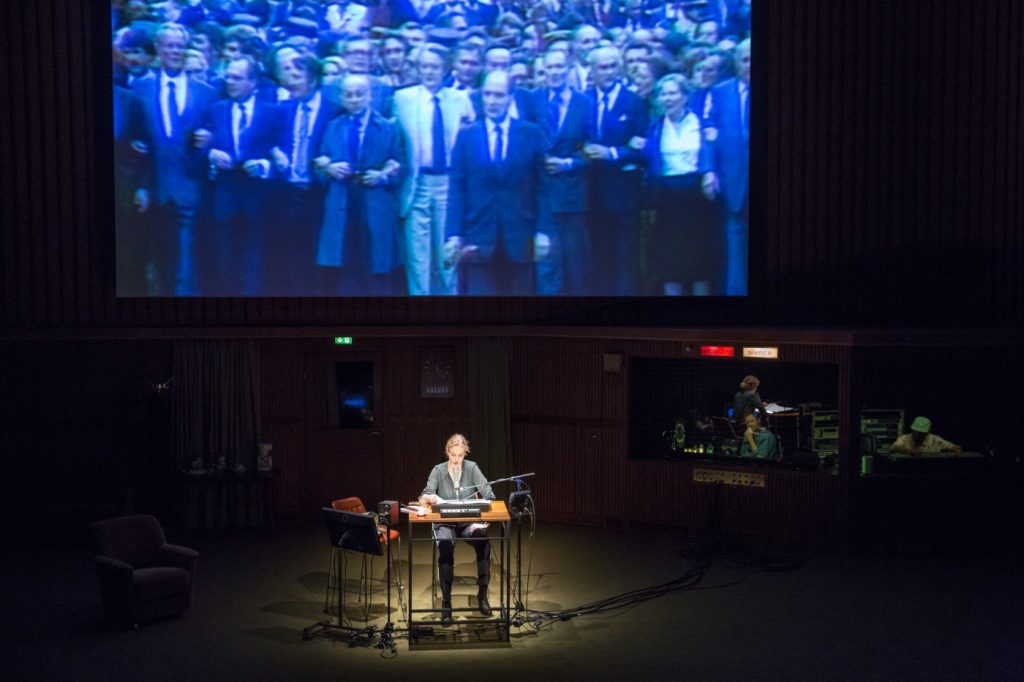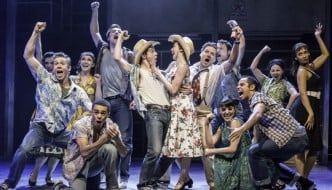Returning to Reims @ MIF17: ‘A compelling portrait of European lived realities’
July 14, 2017

Nina Hoss in Returning to Reims at Manchester International Festival. Photo Credit: Jonathan Keenan
I will openly hold my hands up and admit that I avoid conversations about class with a ten foot pole, having a dual chip on my shoulder about having never understood which, if any, I belong to. I’ve stood with a foot uncomfortably two different class camps, never feeling at home in either. Therefore the full-frontal confrontation of Return to Reims of the self-discovery necessary to come to terms with either resistance or resignation to ones’ class background was an experience I didn’t expect from a drizzly Tuesday night, and one that put me through my paces emotionally. I was never at one moment either entirely comfortable or certain, director Thomas Ostermeier’s masterful adaptation of Didier Eribon’s novel keeping my attention riveted from start to finish. Exactly as I felt I understood where the story was going and began to settle in to the pace of things, I was immediately thrown into new territory, be it by the actors climbing down into the audience and directly requesting our input or a rip-roaring rap interlude.
The plot was complex and comprehensive, spanning from an intellectual coming to terms with the impoverished background, from which he divorced himself completely for decades, through to an analysis of how leftist politics have lost sight of their values. I’m not too proud to admit that the nuances of the intense intellectual discussions between the actors went over my head at multiple points, but for every moment I was submerged under quickfire analysis of Trotsky and Foucault, I was equally drawn back in by snapshots of raw vulnerability of an individual who mourns a parental connection lost before potential reconciliation. Moments that I teetered on the edge of boredom due to extended political metaphor, or near hysteria induced by the man violently masticating the life out of a Werther’s Original in the neighbouring seat, fade instantly when remembering snapshots of sheer delight at the 80s sitcom-inspired raps and the brink of tears swelled to the fore by a daughter speaking with sheer pride about the work of her father.
While it’s true that this play may have moments that won’t be relevant to everyone, there are moments anyone could connect with. The rigorous introspection of Eribon’s deliberate disconnection from his roots and the family that he felt bound him too closely to an oppressive past ring ever more true and timely in the current political and social climate. The extension of Eribon’s reflection to an analysis of how extreme nationalist politics have gained such momentum in modern Europe rang through as a compelling reminder to step outside of my comfortable liberal social echo chamber. Nina Hoss’ character took it a step further by questioning the role of activism in a system that enforces the notion that resistance is futile, making an emotive case for the validity of individual social action. I often find myself erring on the side of cynicism following a year of brutal critique of every romantic humanitarian notion I ever held sacred, but I was surprised to find that I left HOME after this two hour tour de force feeling buoyant and—dare I say it—hopeful for a future that offers more than political extremes, and an art form that makes space for such a discussion.
Filed under: Theatre & Dance
Tagged with: Didier Eribon, Factory, Factory Trailblazer, Manchester International Festival, MIF17, Nina Hoss, political theatre, politics, Returning to Reims, Schaubühne ensemble, theatre, Thomas Ostermeier



Comments